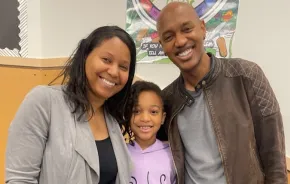It was becoming clear to the parents of 6-year-old Susan that their first-grade girl had decided she could not make any mistakes. Susan's fear of failure made schoolwork a struggle. The family set a rule that all members had to make two mistakes every day and share how they dealt with their difficulties. Gradually, Susan began to see her mistakes as a natural part of life and learning.
Though it may be tempting for parents to shield children from failure and disappointments, children learn skills and gain self-reliance by facing challenges, making mistakes and devising solutions on their own. For parents who look at struggles as opportunities for their children to learn and grow, the good news about the elementary school years is that children are surrounded with a multitude of character-building opportunities.
Events happen for children that can either boost competence levels or decrease them, explains parent educator and author Elizabeth Crary. "The primary developmental task of children ages six to twelve is discovering a structure for how the greater world works," she says.
Provide levels of support
In her book, Dealing with Disappointment: Helping Kids Cope When Things Don't Go Their Way, Crary outlines "levels of support" that parents can offer to children faced with challenges. Geared to differing stages of emotional development in children, this model of parental support helps children eventually learn self-care in handling challenge.
The levels in Crary's model are:
Nurturing: Parents offer full support to their child. For example, if a barking dog scared a child, the parent would acknowledge the fear and comfort the child directly.
Teaching: Parents offer choices for support (for example, "would you like to be held or hugged?)
Coaching: Parents ask what the child might do to help himself, only offering suggestions if the child can't seem to work out the difficulty on his own.
Consultant: The parents listen to the child and assure the child they will be there if they are needed. According to Crary, parents should offer different levels of support according to the emotional maturity of the child. In addition, parents may revert to an earlier level depending on circumstances in a child's life -- for example, a parent may choose to be nurturing with a teen who is breaking up with a first girlfriend or boyfriend.
Support a healthy sense of being and doing
Children who have good self-esteem believe they are both lovable and capable, Crary explains. A mistake may not be as devastating if that child believes that he or she is a good person, and children who are capable can comfort themselves when they feel less lovable. Parents can help their children develop this dual confidence by remembering to offer praise for both of these areas of a child's nature.
Share mistakes and challenges
Jim Graham, a counselor in the Renton School District, advises parents and teachers to raise "the veil of competence" and model examples of mistakes and solutions. "Don't just tell kids it's OK to make mistakes, but explain that adults themselves go through these experiences," Graham explains. "Kids need to understand that parents aren't perfect." Share with your child the time you sent the wrong report to a client. Tell them how you felt about the mistake you made and how you handled it.
Provide the groundwork for mastery
For some five- and six-year olds, kindergarten is the first experience spending a significant time outside of the home. Lisa Zaidi, a clinical psychologist and counselor at Lakeside School, recommends that parents of kindergarteners help their children predict what might happen during the school day. Talk about school rituals they can expect or perhaps role-play the day. "You're not trying to protect them from change, but helping them to prepare for changes in a competent way," Zaidi says. "If we can help the child come up with a plan or know what to expect, we help give them a sense of mastery."
Zaidi sees third grade as another milestone year. Around the age of nine, academic expectations rise. Parents and teacher begin to see a wide range of skills and emotional development levels at this age, and children notice them too. Kids become more competitive and group-oriented in the second half of elementary school. At this stage, parents can help a child continue a sense of mastery by offering praise for a job well done. "If we say everything is great we lose credibility," Zaidi says. "Being genuine helps to make children feel genuinely competent."
Add an element of fun and humor
Connie Lawrence, a first-grade teacher at Kimball Elementary and a former family counselor, tries when possible to have students discover their own mistakes in schoolwork. She may alert students to the presence of errors, encouraging them to sleuth out mistakes on their own. This kind of exercise takes the adult out of the role of critic and adds an element of fun. Lawrence recommends humor as a tool for bonding and getting through tough moments with children.
"Mistakes are part of the learning process...sometimes they are funny," Lawrence says. The late Fred Rogers wrote that perhaps the most important skill children can attain is to master patience, persistence and acceptance of the potential mistakes and disappointments the learning process may bring. "The pleasure and pride we show when a child tries can be more helpful, in the long run," he wisely noted, "than our expressions of pleasure and pride when a child succeeds."
Rhonda Aronwald is a Seattle-based freelance writer and communications consultant, and mother of one.
Reading
The Optimistic Child: A Proven Program to Safeguard Children Against Depression and Build Lifelong Resilience, Martin E. P. Seligman, Ph.D.
Raising Self-Reliant Children in a Self-Indulgent World, J. Stephen Glenn and Jane Nelsen
The Kissing Hand, by Audrey Penn, Ruth E. Harper and Nancy M. Leak (for younger children)
Originally published in the April, 2005 print edition of ParentMap.









